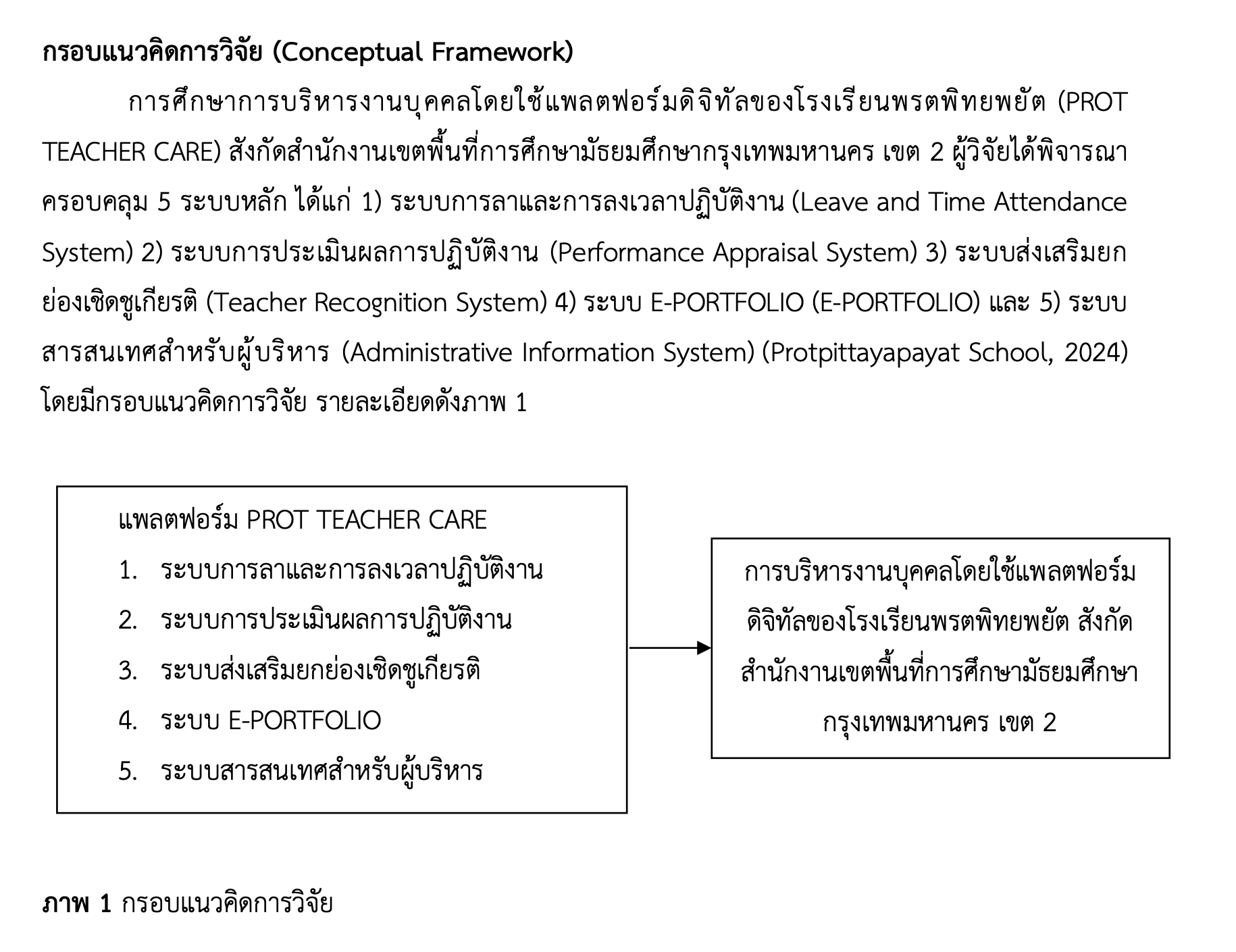Personnel Administration through Digital Platforms of Protpittayapayat School, The Secondary Educational Service Area Office Bangkok 2
Main Article Content
Abstract
This research had two objectives: 1) to study personnel administration through a digital platform at Protpittayapayat School: PROT TEACHER CARE under the Secondary Educational Service Area Office Bangkok 2, and 2) to synthesize opinions and suggestions related to personnel administration using the digital platform. The sample consisted of 108 teachers and educational personnel, selected through simple random sampling. The research instrument was a five-point Likert scale questionnaire with open-ended questions. Quantitative data were analyzed using descriptive statistics, including mean and standard deviation, whereas qualitative data were analyzed using content analysis. The findings revealed that personnel administration through the PROT TEACHER CARE platform was rated at the highest level overall. Ranked in descending order of mean scores, the systems included the performance appraisal system, the leave and time attendance system, the E-PORTFOLIO, the teacher recognition system, and the administrative information system. Qualitative suggestions indicated that the platform should be continuously improved to meet practical needs, such as integrating with centralized databases, developing participatory monitoring and evaluation systems, incorporating motivational functions, and providing user training to facilitate proper system utilization.
Downloads
Article Details

This work is licensed under a Creative Commons Attribution-NonCommercial-NoDerivatives 4.0 International License.
แนวคิดและข้อเสนอแนะที่นำเสนอในบทความของวารสารการบริหารและความเป็นผู้นำทางการศึกษา มหาวิทยาลัยรามคำแหง เป็นแนวคิดที่มาจากผู้เขียน หากมีความผิดพลาดใด ๆ ผู้เขียนเป็นผู้รับผิดชอบแต่เพียงผู้เดียว
ทั้งนี้ บรรณาธิการ กองบรรณาธิการ และคณะกรรมการหน่วยจัดทำวารสารฯ จะไม่ก้าวก่ายความมั่นคงในหลักการตามความคิดของผู้เขียน
ดังนั้น บรรณาธิการ กองบรรณาธิการ คณะกรรมการหน่วยจัดทำวารสาร และมหาวิทยาลัย จะไม่รับผิดชอบใด ๆ จากผลที่เกิดขึ้นจากการนำเสนอแนวคิด และข้อเสนอแนะของผู้แต่งที่เผยแพร่ในวารสารฯ
References
Armstrong, M., and Taylor, S. (2020). Armstrong's Handbook of Human Resource Management Practice (15th ed.). London: Kogan Page.
Barrett, H. C. (2007). Researching Electronic Portfolios and Learner Engagement: The REFLECT Initiative. Journal of Adolescent and Adult Literacy, 50(6), 436-449.
Best, J. W., and Kahn, J. V. (1997). Research in Education (7th ed.). Boston: Allyn and Bacon.
Darling-Hammond, L., Hyler, M. E., and Gardner, M. (2017). Effective Teacher Professional Development. Palo Alto, CA: Learning Policy Institute.
de Jong, W. A., de Kleijn, R. A. M., … van Tartwijk, J. W. F. (2022). Collaborative Spirit: Understanding Distributed
Leadership Practices in and Around Teacher Teams. Teaching and Teacher Education, 123(2023), 1-14.
Holmes, W., Porayska-Pomsta, K., …Baker, T. (2022). Ethics of AI in Education: Towards a Community-wide Framework. British Journal of Educational Technology, 53(6), 1–18.
Kaeokerd, P., and Thamakorn, P. (2022). Information System for Personnel Management. Journal of Business and Industrial Development, 2(1), 107–117. [In Thai].
Kanjanawarathorn, A. (2023). Human Resource Information System for Primary Education Service Area Office. (Doctoral Dissertation, Silpakorn University). [In Thai].
Kotbantao, S. (2017). Educational Administration: Principles and Theories (Revised ed.). Bangkok: Panyachon Publishing. [In Thai].
Krejcie, R. V., and Morgan, D. W. (1970). Determining Sample Size for Research Activities. Educational and Psychological Measurement, 30(3), 607-610.
Laudon, K. C., and Laudon, J. P. (2020). Management Information Systems: Managing the Digital Firm (16th ed.). New York, NY: Pearson.
National Innovation Agency. (2010). Report on the Development of Educational Innovation Organizations. Bangkok: National Innovation Agency. [In Thai].
OECD. (2020). Digital Education Outlook 2020: Pushing the Frontiers with AI, Blockchain, and Robots. Paris: OECD Publishing.
Office of the Basic Education Commission. (2024). Policy and Focus Areas for Basic Education Development, Fiscal Year 2025–2026. Bangkok: OBEC. [In Thai].
Protpittayapayat School. (2024). Internal Quality Assessment Report of Protpittayapayat School, Academic Year 2024. Bangkok: Bangkok Educational Service Area Office 2, Office of the Basic Education Commission, Ministry of Education.
Sriphimai, P., and Buosonte, R. (2019). A Development of the Evaluability Assessment Model for Educational Program. Journal of Education Naresuan University, 21(4), 212–223. [In Thai].
Suksiri, K., Onkong, S., and Yotharak, M. (2024). Guidelines for Personel Management Using Database Systems in the Digital Era for Educational Institutions in Surat Thani 2 Multi-Campus under Surat Thani Chumphon Secondary Educational Service Area Office. Journal of Social Science Panyapat, 6(2), 351–362. [In Thai].
Suriyanayong, S., and Waichomphu, N. (2023). School Administration Using Digital Platforms in Schools under Songkhla Satun Secondary Educational Service Area Office. Journal of Local Management and Innovation, 5(3), 1-15. [In Thai].
Tambe, P., Cappelli, P., and Yakubovich, V. (2019). Artificial Intelligence in Human Resources Management: Challenges and a Path Forward. California Management Review, 61(4), 15–42.
Wright, P., and McMahan, G. (2011). Exploring Human Capital: Putting Human Back into Strategic Human Resource Management. Human Resource Management Journal, 21(2), 93-104.


